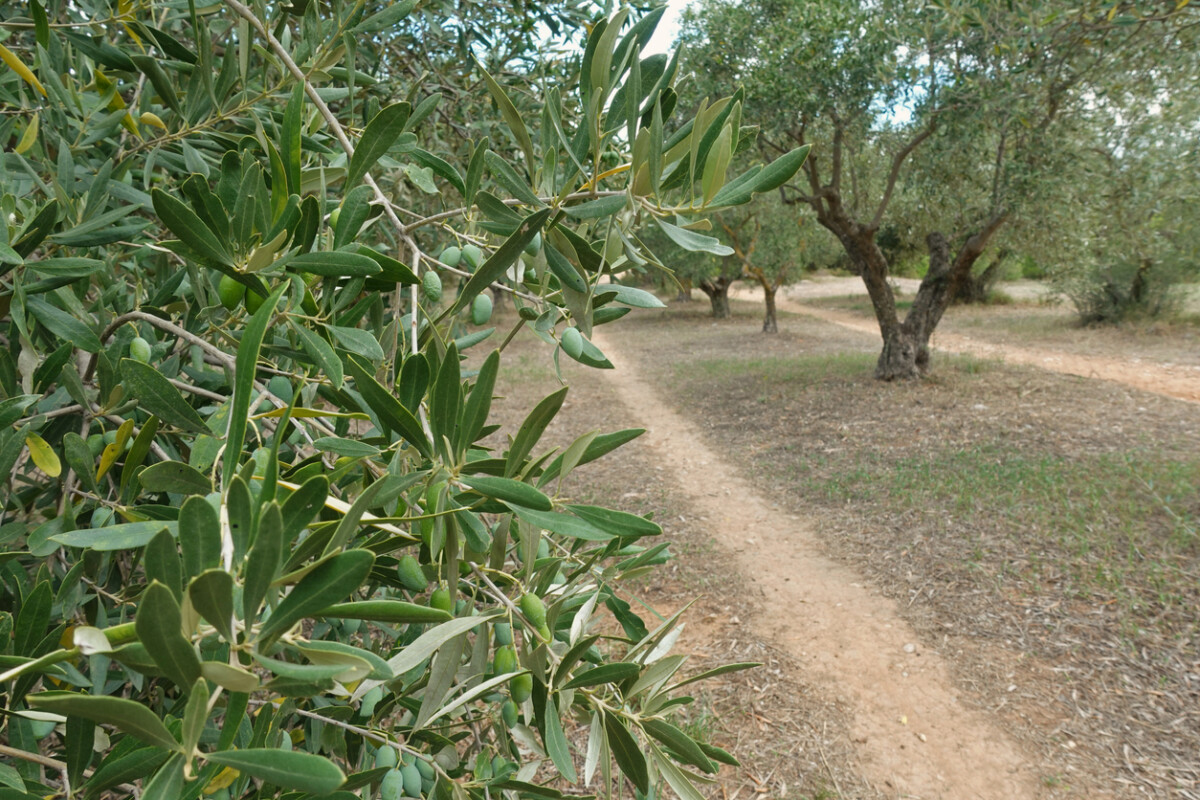
Rows of olive trees basking under the Mediterranean sun are a testament to the region’s rich agricultural history.
As a child, I vividly remember breakfasts composed of freshly toasted whole wheat pita bread dipped in olive oil and zaatar, accompanied by ripe tomatoes and hard-boiled eggs. This quintessential Mediterranean breakfast fueled my day. In the heart of our kitchen sat a bowl “zait,” the Arabic word for olive oil, zaatar, and olives, a flavorful trio my mother liberally used in our daily meals. From her tabbouleh, where olive oil danced harmoniously with lemon juice, to our staple rice dishes—often cooked in a wholesome mix of olive oil and ghee—this treasured oil was the lifeblood of our cuisine. Even now, these culinary traditions continue in my kitchen.
Growing up, the arrival of the olive oil season was a joyous occasion, a significant event etched deep in my memory. My father would return with several 5-gallon containers of fresh-pressed olive oil. This liquid gold, stored cautiously away from heat and light, served as a cornerstone of our meals throughout the year until the next harvest.
This aromatic essence was more than a cooking ingredient—it was a testament to our heritage, a cornerstone of the Mediterranean diet, and a symbol of our lifestyle. These early experiences sparked a deep appreciation for olive oil and ingrained its integral role in the Mediterranean lifestyle—a tradition I passionately uphold today.
The Deep-Rooted History of Olive Oil
In the diverse landscape of the Mediterranean region, the olive tree stands as a symbol of endurance, rooted deep in the culture and history of its people. Olive oil, an elixir born of this resilient tree, is at the core of the Mediterranean lifestyle, transcending boundaries and fostering unity in culinary customs.
Among the varied olive-growing regions, Palestine holds a significant position due to its rich tradition of olive cultivation. Palestinian olive oil, renowned for its distinct flavor profile—from intensely peppery to subtly fruity—is a cherished product of this ancient land. This unique taste is primarily attributed to indigenous olive tree varieties, such as the hardy Rumi and the prolific Souri, that have adapted to Palestine’s distinct climate and terroir over millennia.
Olive trees in the Mediterranean region are a testament to Tarea’sa’s rich biodiversity. From the robust Koroneiki variety in Greece, known for its high oil yield, to the versatile Arbequina variety in Spain, loved for its sweet and mild flavor. Each region boasts unique cultivars, contributing to Mediterranean olive oils’ wide range of flavors and aromas.
The Harvesting Tradition
Harvest season in the Mediterranean is a time of community, celebration, and labor. It spans October to December, varying by region and olive variety. Whether by hand or tools, the goal is to gently shake ripe olives onto the nets below.
From Tree to Bottle
Once harvested, olives move quickly to the mill to retain freshness. The extraction process merges tradition with technology. After cleaning, olives transform into paste via grinders. Through malaxation, the paste churns slowly, allowing oil droplets to unify.
The Final Touch
Centrifugation is the last step, separating oil from solid paste and water. The resulting olive oil finds a home in stainless steel containers, shielded from elements to preserve its pristine state until bottling.
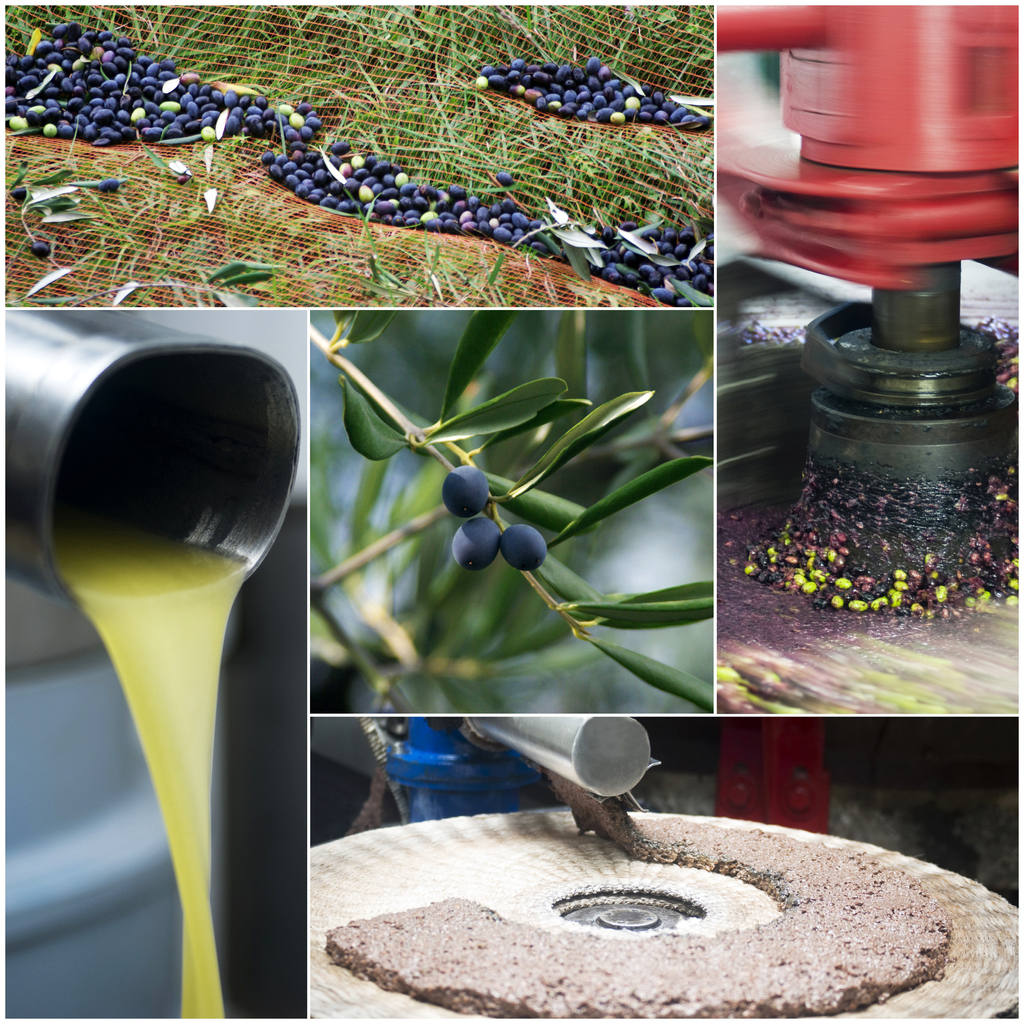
Extra-virgin oil production. Harvest time in the area of oil production” n “Taggia” co” – most famous in Italy
The entire process—from tree to bottle—reflects the respect and commitment of Mediterranean cultures to preserve the integrity and quality of their olive oil. Embedded in every drop of olive oil, this dedication reinforces its central role in the Mediterranean diet—a lifestyle that values balance, longevity, and the enjoyment of wholesome, flavorful foods.
Olive Oil: Mediterranean’s Health Secret
Extra virgin olive oil is nutritionally rich, loaded with monounsaturated fats, polyphenols, and vitamins E and K. Research has linked it to a plethora of health benefits:
- Heart Health: Olive oil, abundant in monounsaturated fats—especially oleic acid—promotes heart health. Studies show it improves cholesterol levels, regulates blood pressure, and helps control blood sugar, reducing cardiovascular disease risks.
- Anti-Inflammatory Properties: Olioil’sl’s antioxidants, like oleocanthal, have similar effects to ibuprofen, a renowned anti-inflammatory drug. A diet rich in olive oil could potentially mitigate inflammation-related diseases like arthritis, metabolic syndrome, and Alzheimer’s.
- Digestive Health: Olive oil aids digestion and may help prevent constipation due to its mild laxative properties.
- Skin and Hair Health: Olive oil’s hydrating properties and rich antioxidant content make it a beauty essential, offering anti-aging benefits, skin damage prevention, and hair nourishment.
- Bone Health: Preliminary studies suggest that olive oil could bolster bone health by improving bone mineral density and serum calcium concentrations, though more research is needed.
- Cancer Prevention: Olive oil’s high antioxidant content and anti-inflammatory properties may protect against certain cancers, including breast and colon cancer, though further research is required.
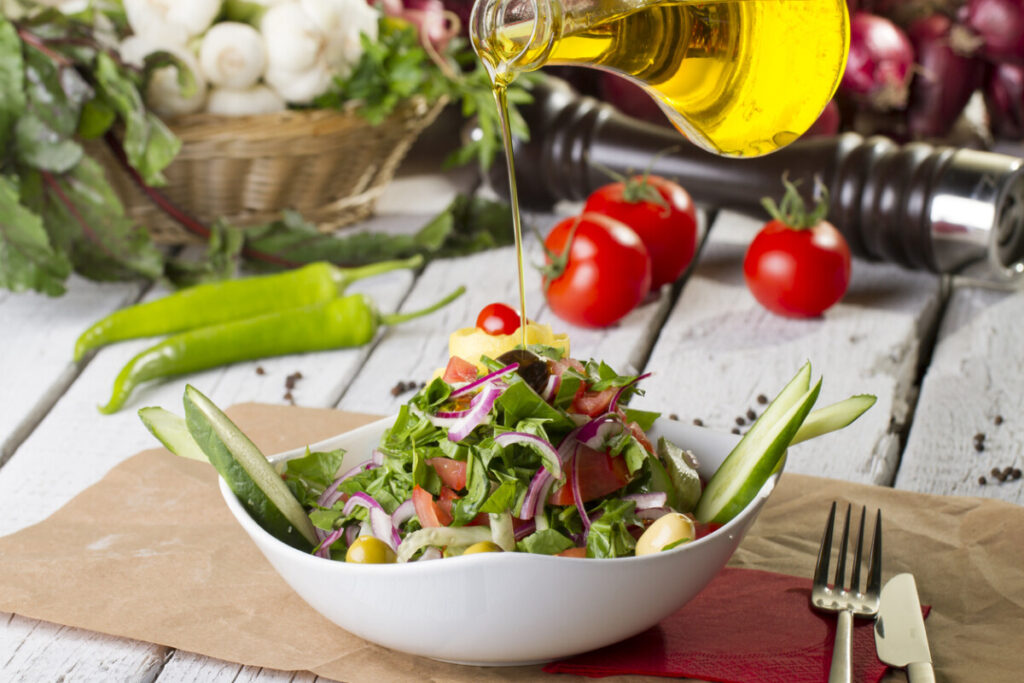
A tantalizing drizzle of olive oil enhances the vibrant flavors of a fresh salad.
Olive Oil in Mediterranean Culinary Delights
Olive oil’s cultural significance extends deep into the Mediterranean diet. Beyond being a mere cooking medium, it embodies the region’s ancient wisdom, culinary heritage, and the spirit of communal dining.
In my kitchen, olive oil stands unchallenged. Its versatility is unparalleled, shining brightly in everything from dressings to finishing drizzles. The essence of olive oil enriches my favorite recipes, weaving them together with its distinctive character.
For instance, a basic olive oil vinaigrette can elevate a simple salad into a medley of balanced flavors in salad dressings. Creamy, tangy concoctions like Avocado Balsamic Dressing or herb-laden Greek Goddess Dressing owe their allure to olive oil. And when it comes to dips—hummus, baba ganoush, whipped feta dip, or muhammara—a finishing touch of olive oil enhances their earthy and nutty profiles.
Olive Oil: The Mediterranean Elixir of Health
Olive oil’s role in the Mediterranean diet isn’t limited to its taste; its health benefits are profound. Consuming it daily can bolster digestive health and bone strength, thanks to its rich monounsaturated fat content. Antioxidants like oleocanthal lend it anti-inflammatory properties, making it more than just a culinary ingredient.
In the Mediterranean lifestyle, olive oil symbolizes a harmonious blend of good health, delectable flavors, and cherished moments around the dining table. Adopting olive oil in your culinary endeavors means embracing a tradition steeped in history and health.
U.S. vs. Mediterranean Olive Oil Production
While the Mediterranean is olive oil’s historic home, its production is rising in the U.S., especially in California. This state produces roughly 95% of U.S. olive oil, with the rest coming from states like Texas, Arizona, and Florida.
Like their Mediterranean counterparts, U.S. growers also focus on producing high-quality Extra Virgin Olive Oil (EVOO). Many California oils, for example, adhere to strict standards set by the California Olive Oil Council (COOC), which exceed those of the International Olive Council (IOC). This commitment to quality has led to increased recognition of U.S. olive oils in international competitions.
The olive varieties grown in the U.S. are pretty diverse. Many growers cultivate the Mission olive, a variety native to California. But you’ll also find types originating in Italy, Spain, France, and Greece. This variety means that the flavor profiles of American olive oils can be just as diverse as those from the Mediterranean.
The Mediterranean climate of regions like California is perfect for olive cultivation. Its hot, dry summers and mild, wet winters allow for growth like the Mediterranean region.
A lot depends on personal preference when choosing between Mediterranean and US-produced olive oil. You might prefer the peppery punch of Tuscan oil, the grassiness of oil from Greece, or the balanced, fruity notes from California. The key is to choose a quality product that suits your taste and enhances your dishes.
Remember, whether it comes from the sun-drenched groves of the Mediterranean or the fertile soils of California, good olive oil is characterized by its freshness, flavor, and aroma. So explore, experiment, and discover your personal favorite. Your culinary adventures await!
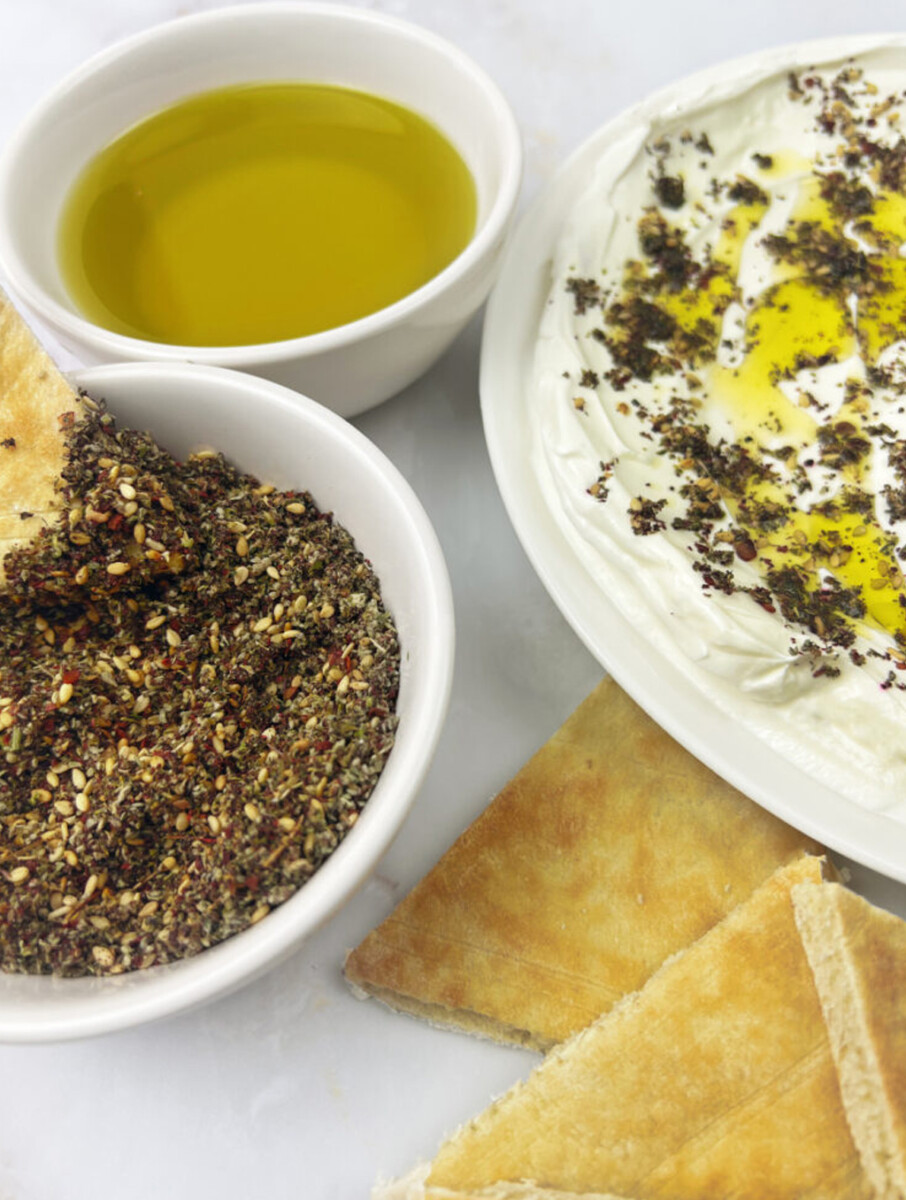
Morning Delight: A bowl of olive oil, za’atar, and creamy labneh, a tradition in every bite.
Olive Oil FAQs:
What is the smoke point of olive oil?
- Extra virgin olive oil (EVOO): The smoke point of EVOO can vary depending on its quality and how it’s produced. Lower acidity and fresher oils tend to have higher smoke points. As you mentioned, the range for most EVOO is approximately 350-410°F (175-210°C).
- Refined or light olive oils: These are more processed than EVOO and, as a result, they have a higher smoke point. Your figure, around 470°F (243°C), is accurate for many refined olive oils.
However, it’s essential to note that while smoke point is a factor to consider when choosing a cooking oil, it’s not the only one. Despite its lower smoke point compared to other oils, EVOO is rich in antioxidants and has been shown to retain its health benefits even when heated, as long as it’s not heated past its smoke point.
Can I fry it with olive oil?
Yes, you can fry with olive oil. While it’s true that the smoke point of extra virgin olive oil is lower than some other oils, it is still adequately high for most types of home cooking, including frying and sautéing. However, it’s essential to note that you should not reuse oil that has been previously used for frying, as it can degrade and produce harmful compounds.
Can olive oil make me gain weight?
Olive oil is high in calories, like all oils. However, it’s rich in healthy monounsaturated fats and can be an integral part of a balanced diet. In the Mediterranean diet, consuming 2 to 3 tablespoons of olive oil daily is normal. This can be done by adding it to salads, sautéing vegetables, or even drizzling over whole grain bread as a healthier alternative to butter.
Is olive oil bad for my cholesterol?
No, olive oil is beneficial for your cholesterol levels. It’s high in monounsaturated fats, which can help raise levels of bad LDL cholesterol and increase good HDL cholesterol.
How many calories are there in olive oil?
Like all pure fats, olive oil contains about 120 calories per tablespoon. It’s essential to use it in moderation to maintain a balanced diet.
Can I use olive oil in baking?
Yes, olive oil can be used in baking. It can be a healthier alternative to butter or other vegetable oils. Olive oil can lend depth and richness to foods, incredibly savory baked goods, and sure desserts. Be aware, however, that it will impart a distinct flavor, which may not be suitable for all types of baked goods.
What is the difference between extra virgin olive oil and regular olive oil?
Extra virgin olive oil (EVOO) is the highest quality olive oil. It’s made from pure, cold-pressed olives, whereas rIt’sar olive oil is a blend of cold-pressed and processed oils. EVOO has a more robust flavor, contains more nutrients, and is generally more expensive than regular olive oil.
What does ‘cold-pressed’ mean, and why is it important?
Cold-pressed means that the oil is extracted from the olives using a mechanical method without heat or chemicals. This is important as it preserves the olive oil’s nutritional profile. High temperatures during extraction can affect the taste characteristics. It can also degrade the oil’s quality and nutritional content.
How should olive oil be stored to maintain its freshness and quality?
Olive oil should be stored in a cool, dark place away from heat and light, which can degrade its quality. It’s best to use olive oil within a year of opening. Picking it in an airtight container will also help maintain its freshness.
Can you use olive oil for skincare or hair care?
Olive oil is rich in antioxidants and hydrating squalene, making it superb for hair and skin. It’s often used as a moisturizer, cleanser, or mask for skin and as a conditioner for hair. Always do a patch test before applying it to your skin to avoid an adverse reaction.
What are the health benefits of olive oil compared to other types of fat?
Olive oil, primarily known for its culinary uses, is also rich in monounsaturated fats, especially oleic acid, which have been consistently linked to heart health. In addition to these fats, it boasts a plethora of antioxidants that not only exhibit anti-inflammatory properties but also aid in protecting against chronic diseases. Furthermore, when compared to other oils, olive oil presents a more favorable nutrient composition. It has notably less saturated fat and is enriched with a greater abundance of beneficial compounds.
What should you look for on the label when buying olive oil?
Look for the “extra virgin” designation indicating the highest quality. Also, check for a harvest date to ensure freshness—oil less than a year old is best. Select oil packaged in dark glass or tin if possible, which helps protect the oil from light damage. “Certified seals like PDO or PGI indicate quality. Seals from olive oil associations are also reliable.
Remember, when it comes to nutrition and cooking, everyone’s needs and preferences vary, and what works for everyone may not work for another. It’s essential to experiment and find out what works best for you.
Further Reading and References
For those interested in diving deeper into the health benefits and research surrounding olive oil, below are the sources referenced in this article.
- American Heart Association. (2022). The benefits of adding a drizzle of olive oil to your diet. Retrieved from https://www.heart.org/en/news/2022/09/28/the-benefits-of-adding-a-drizzle-of-olive-oil-to-your-diet
- Buckland, G., & González, C. A. (2020). Role of olive oil in disease prevention: a focus on the recent epidemiological evidence from cohort studies and dietary intervention trials. British Journal of Nutrition. Retrieved from https://www.cambridge.org/core/journals/british-journal-of-nutrition/article/role-of-olive-oil-in-disease-prevention-a-focus-on-the-recent-epidemiological-evidence-from-cohort-studies-and-dietary-intervention-trials/067113B01A4A7254066C542D640BC1AE
- Harvard Health Publishing. (n.d.). Harvard study: High olive oil consumption associated with longevity. Harvard Medical School. Retrieved from https://www.health.harvard.edu/staying-healthy/harvard-study-high-olive-oil-consumption-associated-with-longevity
- Mazzocchi, A., Leone, L., Agostoni, C., & Pali-Schöll, I. (2019). The secrets of the Mediterranean diet. Does [Only] olive oil matter? Nutrients, 11(11), 2941. Retrieved from https://www.ncbi.nlm.nih.gov/pmc/articles/PMC6770785/




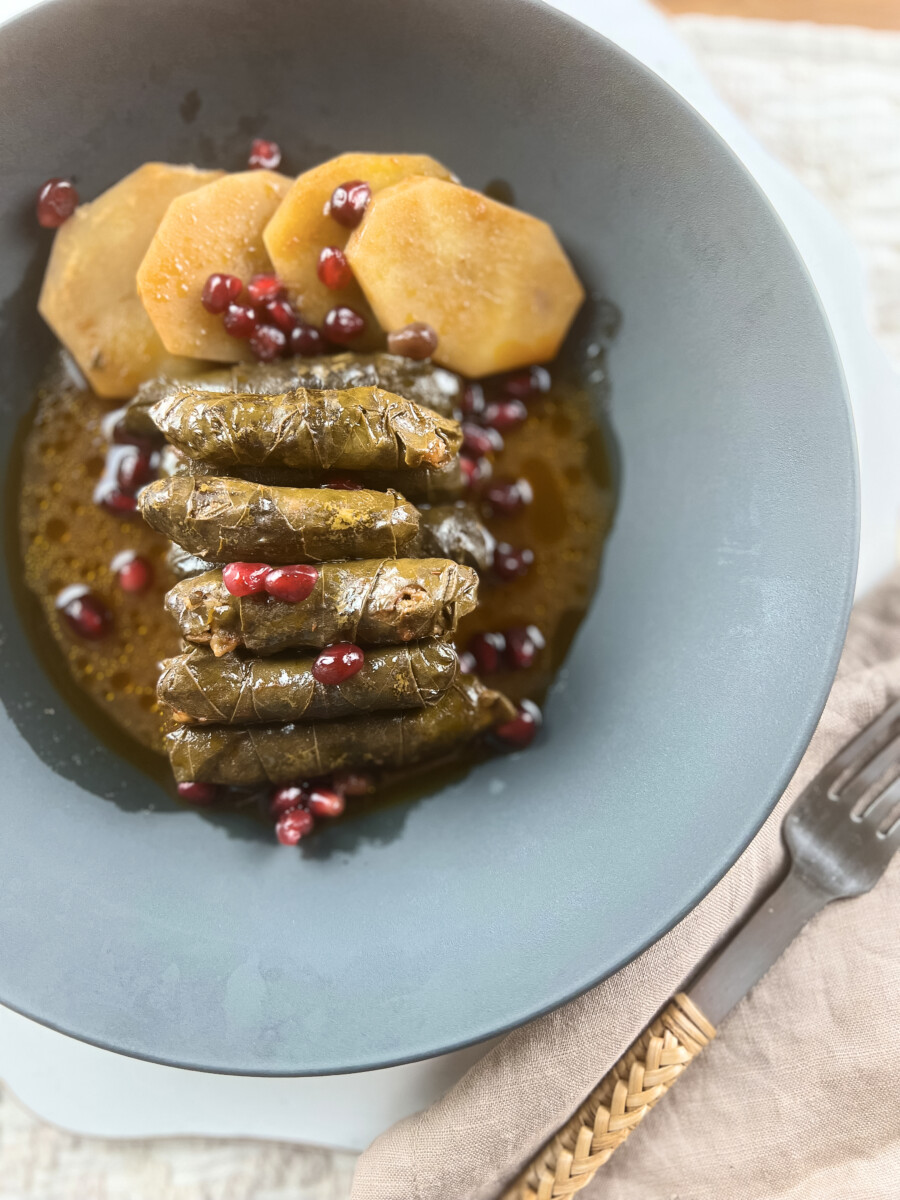



Leave a Reply